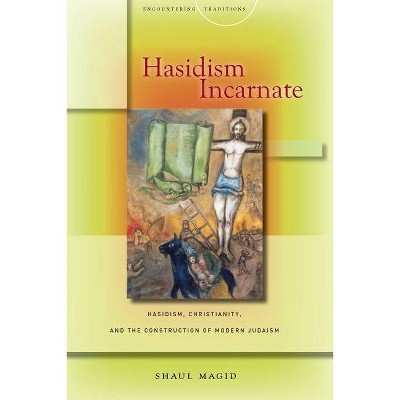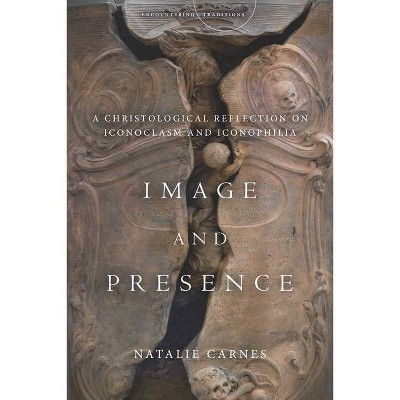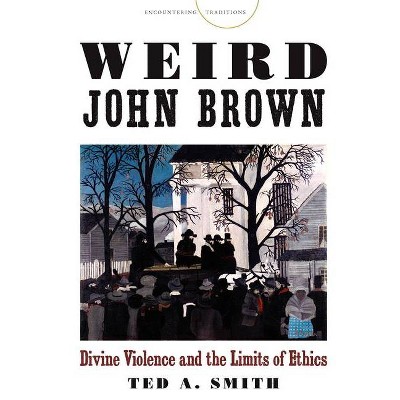Ethics as a Work of Charity - (Encountering Traditions) by David Decosimo (Hardcover)

Similar Products
Products of same category from the store
AllProduct info
<p/><br></br><p><b> About the Book </b></p></br></br>The first comprehensive analysis of Thomas Aquinas's conception of pagan virtue, this book advances a fresh paradigm for understanding the shape and spirit of Thomas's synthesis of Christian and Aristotelian traditions, a distinctive vision for his contribution to contemporary political and moral theology, and a constructive proposal for welcoming outsiders and their virtues without forsaking one's own commitments--whatever they may be.<p/><br></br><p><b> Book Synopsis </b></p></br></br>The first comprehensive analysis of Thomas Aquinas's conception of pagan virtue, this book advances a fresh paradigm for understanding the shape and spirit of Thomas's synthesis of Christian and Aristotelian traditions, a distinctive vision for his contribution to contemporary political and moral theology, and a constructive proposal for welcoming outsiders and their virtues without forsaking one's own commitments-whatever they may be.<p/><br></br><p><b> Review Quotes </b></p></br></br><br><i>Ethics as a Work of Charity</i> is a compelling and original contribution to both Aquinas scholarship and contemporary religious ethics. Historically and exegetically sensitive, Decosimo offers a close reading of Aquinas's influential account of pagan virtue in ways that provide a fresh resource for engaging religious and moral diversity without sacrificing conviction. By advancing a distinctively 'prophetic Thomism' that is at once deeply Aristotelian and deeply Augustinian, this book transcends many of the intellectual and political agendas that exacerbate the conflicts of our age. It should command the interest of many in philosophy, theology, and religious studies.--Eric Gregory "Princeton University"<br><br><i>Ethics as a Work of Charity</i> is an impressive book on the whole and in its various moving parts. It will be of interest to those interested in virtue ethics, theology of religious outsiders, political Augustinians, and those interested in the relationship between theology and philosophy, faith and reason, natural and supernatural, and nature and grace.--Sean Larsen "<i> Modern Theology</i>"<br><br>[Decosimo] generates a tapestry of themes--Aquinas on goodness, ends, desire, habit, sin, and grace--and each theme introduced and expounded with such care that the book is a rich and thorough resource both for undergraduate students and teachers alike.--Ruth Jackson "<i>Anglican Theological Review</i>"<br><br>[Decosimo] presents a lucid and innovative argument about the disputed status of 'pagan virtue' in debates in Christian ethics. To some readers, the very notion of 'pagan virtue' will raise eyebrows. Yet while most Christians today continue to believe that Christian faith permeates and transforms all aspects of a believer's life, most also affirm that people of any religious faith - or none - are capable of living virtuous lives . . . <i>Ethics as a Work of Charity</i> makes a substantial contribution to a perennial debate in Thomistic moral theology.--William Mattison "<i>Commonweal Magazine</i>"<br><br>[T]he author argues that Aquinas welcomes pagan virtues. All of humanity share in sin's brokenness and a desire for good. A capacity for virtue is thus part of what it means to be human . . . This important work shows us how central the virtues are for Aquinas's moral theology.--Pravin Thevathasan "<i>Catholic Medical Quarterly</i>"<br><br>A penetrating study of Aquinas's treatment of pagan virtue, showing its roots in Aristotle and Augustine and its relevance for contemporary ethics, while reaffirming the fundamental Christian conviction that virtue requires the action of grace. This is a major contribution to Aquinas interpretation and theological efforts to navigate religious diversity with fidelity and generosity.--Archbishop J. Augustine Di Noia, OP "Vatican City"<br><br>Decosimo does painstaking exegetical work to show that the kind of virtue Thomas affirms of pagans is true virtue, a stable habit that generates good actions that perfect our natural capacities . . . Decosimo has helped us see a better way, recovering an aspect of Thomas's theological ethics with possibilities that have not always been acknowledged. [He] has written a landmark book of lasting importance.--Jordan Hylden "<i>The Living Church</i>"<br><br>Decosimo's writing is precise and inviting, from the well-structured chapters down to the clear and manageable sentences. He explains Thomistic concepts well and with appropriate, contemporary examples. The book would be appropriate for classroom use at the masters' level and above...It will be an important resource to those interested in Aquinas as well as to Christians pursuing interreligious dialogue.--Kate Ward "<i> Political Theology</i>"<br><br>The core of Decosimo's book is a thorough, textually grounded and convincing reply to those who deny that, on Aquinas's view, true virtue is impossible without grace. As such, it represents an important contribution to an ongoing debate. At the same time, in the process of making his case against 'Augustinian' readings of Aquinas, Decosimo sets out an illuminating account of Aquinas's conception of virtue as a kind of perfection, together with insightful remarks on the development of the virtues, the structure of moral motivation, and the presuppositions for attaining stability of character.--Jean Porter "<i>Studies in Christian Ethics</i>"<br><br>This book is a substantial contribution to the literature on Thomas Aquinas's understanding of acquired moral virtue and the related issue of whether unbelievers can possess moral virtue . . . The book as a whole should make Thomas's moral theology more accessible to those who have not yet been exposed to it.--Thomas M. Osborne Jr. "<i>The Expository Times</i>"<br><br>This is an important new work on the status of the virtues in Aquinas's moral theology. With a stunning command of the text and of the contemporary critical scene, David Decosimo argues that for St. Thomas, the pagan virtues are genuine virtues, that pagans achieve real good, and that such 'hyper-Augustinians' as John Milbank have not said the last word on the relation between virtue theory and moral theology. Decosimo's argument is compelling and opens up new paths for future work in the field.--G. Scott Davis "University of Richmond"<br><br>While <i>Ethics as a Work of Charity</i> contains many close readings and strives to settle any number of textual disputes, it is not at all a pedantic work. Its chief virtue lies in the thoughtful and imaginative use to which it puts these careful readings. Decosimo adopts a spirit that he finds in Aquinas himself, one that combines an insistence on attentiveness with an even greater insistence on charity. As a result, Decosimo puts his considerable philosophical skills to work in articulating a full and sophisticated account of habit, virtue, and human happiness drawn chiefly from Aquinas's mature writings.--Jeffrey Hause "<i>Notre Dame Philosophical Reviews</i>"<br><br>With great care Decosimo explicates Aquinas's understanding of the virtues of the pagan in a manner that challenges the presumption that Aquinas thought such virtues inherently deficient. To address this subject entails going to the heart of Aquinas's theology and ethics. Decosimo has done just that and in doing so helps us see what Aquinas's thought demands of us if we are to understand what it means to be God's creatures. This is a book that will demand both scholarly attention as well as the attention of the general reader.--Stanley Hauerwas "Duke University"<br><p/><br></br><p><b> About the Author </b></p></br></br><b>David Decosimo</b> is Assistant Professor of Theology at Boston University.
Price History
Price Archive shows prices from various stores, lets you see history and find the cheapest. There is no actual sale on the website. For all support, inquiry and suggestion messagescommunication@pricearchive.us



















